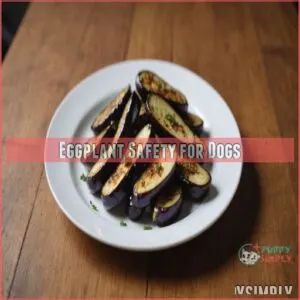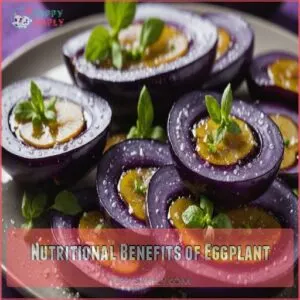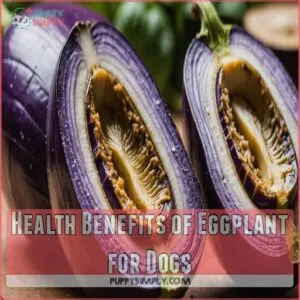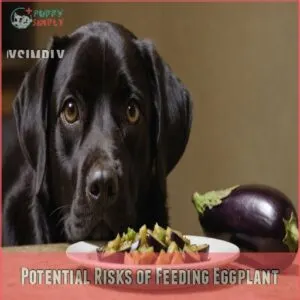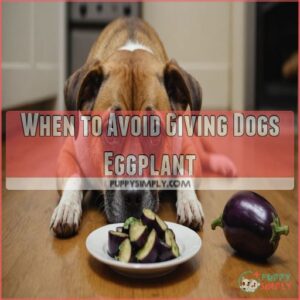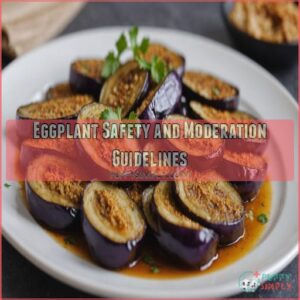This site is supported by our readers. We may earn a commission, at no cost to you, if you purchase through links.
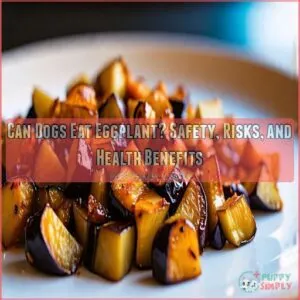 Can dogs eat eggplant? Yes, but with caution!
Can dogs eat eggplant? Yes, but with caution!
You can offer your pup cooked eggplant in small amounts.
Think of it as an occasional treat, not a main course.
Always chop it finely to avoid choking hazards.
Seasoning’s a no-no; keep it plain to prevent tummy troubles.
Eggplant offers some nutritional benefits, but too much could upset their digestion.
It’s all about moderation, right?
Want to learn more about safely incorporating eggplant into your dog’s diet, and understand the importance of consulting a vet before adding new fruits like safe fruits for dogs, to their diet? We’ve got some helpful tips and tricks coming up…
Table Of Contents
- Key Takeaways
- Eggplant Safety for Dogs
- Nutritional Benefits of Eggplant
- Eggplant Allergy Symptoms in Dogs
- Preparing and Cooking Eggplant
- Health Benefits of Eggplant for Dogs
- Potential Risks of Feeding Eggplant
- Incorporating Eggplant Into a Dog’s Diet
- When to Avoid Giving Dogs Eggplant
- Veterinary Guidance on Eggplant Consumption
- Eggplant Safety and Moderation Guidelines
- Frequently Asked Questions (FAQs)
- Can dogs eat fruits & vegetables?
- Are eggplants poisonous to dogs?
- Can dogs eat breaded eggplant?
- Are eggplants good for dogs?
- Are eggplants toxic to dogs?
- What vegetables dogs Cannot eat?
- Can dogs eat zucchini or eggplant?
- Can dogs eat baba ganoush?
- How does eggplant affect a dogs mood?
- Is raw eggplant more nutritious for dogs?
- Can puppies safely consume eggplant?
- Are different eggplant varieties suitable for dogs?
- Does eggplant impact a dogs hydration levels?
- Conclusion
Key Takeaways
- Offer your dog small amounts of cooked eggplant as an occasional treat to avoid digestive issues.
- Always prepare eggplant plain and without seasoning, and monitor for any adverse reactions.
- Be cautious of potential allergies due to eggplant’s solanine content; consult your vet if you are unsure.
- Keep eggplant away from dogs with known food allergies or existing health conditions like kidney issues.
Eggplant Safety for Dogs
If you’re wondering whether dogs can safely munch on eggplant, moderation is key.
Just a few small bites of plain, cooked eggplant can be a safe occasional treat, but it’s important to avoid harmful additives like garlic or onion.
Moderation Guidelines
Eggplant can be a delightful, occasional treat for your furry friend—but don’t overdo it.
Keep it simple with a few small, cooked bites.
Monitor how your dog reacts and adjust as needed.
Remember, treat, not meal!
Just like us, dogs need variety, so mix things up while keeping eggplant a rare star in their dog diet.
Potential Risks and Allergies
Next up, let’s chat about potential risks.
While your dog might love a nibble of eggplant, watch out for eggplant sensitivity, especially if they’re prone to dog allergies.
Some dogs react to solanine levels since eggplant’s in the nightshade family.
Allergic reactions can vary, so keep an eye out and seek veterinary advice if needed.
Safety first!
Nutritional Benefits
Worrying about your dog’s health? Learn about eggplant’s nutritional perks!
Packed with fiber and boasting Antioxidant Power, similar to nutrient-rich Asian greens like Bok Choy for Dogs, eggplant supports canine nutrition and dog health.
Vitamins A, C, and K offer a Vitamin Boost without breaking the caloric bank, making it ideal for Weight Management.
Toss in some eggplant nutrition alongside dog-friendly fruits and vegetables for a spark of healthy variety.
Preparing and Serving Eggplant
After exploring the benefits of eggplant for your pup, it’s time to think about the hows.
Wash it well, remove the skin for easier digestion, and prepare with minimal seasoning.
Here’s how to serve it:
- Dice and cook it by steaming or baking.
- Stick to small portions to avoid tummy troubles.
- Monitor for allergies—better safe than sorry.
Nutritional Benefits of Eggplant
You’ll find that eggplant offers several nutritional perks for your canine companion.
It’s packed with vitamins, minerals, and antioxidants that support their overall health and well-being, making it a surprisingly healthy treat (in moderation, of course!).
Fiber Content and Digestive Health
You’re probably thinking about safe dog snacks, right?
Eggplant’s fiber content can help with your dog’s digestion.
It’s like a gentle sweep for their gut!
Fiber benefits include digestive support, aiding in dog digestive health, and even helping with dog obesity.
So, when you’re considering dog-friendly fruits and vegetables, eggplant’s a healthy choice for occasional treats.
Antioxidants and Canine Wellness
Boost your dog’s well-being with eggplant’s antioxidant benefits.
These compounds fight free radical damage, aiding immune system health and reducing oxidative stress.
Want your furry friend to enjoy healthy aging?
- Promotes canine health with antioxidants
- Supports dog nutrition as a safe human food
- Helps dogs with potential food sensitivities
Try incorporating eggplant into their diet safely!
Vitamins and Minerals in Eggplant
Eggplants aren’t just yummy; they’re packed with vitamins and minerals that boost your dog’s health.
Vitamin K helps with blood clotting, while C supports the immune system.
Minerals like potassium and manganese are great for nerve function and bones.
So, tossing a bit of this veggie into your pup’s diet makes for a delightful, nutritious snack.
Weight Management Benefits
If you’re aiming for weight management in your dog, eggplant’s low-calorie and fiber-rich goodness is a smart choice.
Offering a healthy alternative to calorie-packed treats, it helps tackle canine obesity gently.
Just imagine your pup enjoying these guilt-free, light snacks.
Remember, though, to introduce eggplant gradually, monitoring for any potential risks or adverse reactions.
Eggplant Allergy Symptoms in Dogs
If your dog shows signs like itching or vomiting after eating eggplant, they might’ve an allergy.
Keep an eye on symptoms and consult your vet to make sure your pet’s safety.
Recognizing Signs of Allergy
While eggplants offer nutritional perks, they’re part of the nightshade family, which means potential risks, including eggplant allergy in dogs.
Keep an eye out for dog allergy symptoms like skin reactions, digestive upset, or changes in behavior such as excessive licking or lethargy.
When you’re introducing new foods to dogs, always monitor for any allergic reactions and consult your vet.
Common Allergic Reactions
So, you’ve noticed some allergy signs.
Common reactions to eggplant in dogs include vomiting, diarrhea, and skin irritation like hives or excessive itching.
These symptoms, along with lethargy, might indicate a problem.
Remember, eggplant belongs to the nightshade family, a known source of allergic reactions.
Always consult your vet if you suspect an eggplant allergy.
Early detection is key!
Emergency Care for Severe Reactions
A sudden eggplant allergy in your dog can spark panic, but calmness is key.
Keep an eye out for symptoms like swollen paws or difficulty breathing.
Rush to the vet for emergency care if these occur.
Anaphylaxis treatment might follow, with antihistamines as backup.
Always keep veterinary guidance handy.
Prompt action guarantees your furry friend stays safely wagging.
Preparing and Cooking Eggplant
When you’re preparing eggplant for your dog, you should wash it thoroughly and remove any stems or leaves, which can be harmful.
Stick to simple cooking methods like baking or steaming without adding any seasonings, so your furry friend can safely enjoy this nutritious treat.
Washing and Cleaning Techniques
Worrying about eggplant allergies is common, but let’s focus on proper washing and cleaning techniques.
Start by rinsing the eggplant under cold water to scrub away dirt and chemicals, similar to how you’d want to clean dogs paws after a messy walk.
Safe cleaning is essential before cooking.
This straightforward step helps you remove any contaminants, making it safer for dogs.
Remember, proper washing fits seamlessly into your kitchen routine!
Removing Stems, Leaves, and Skin
Before feeding your dog eggplant, always remove the stems and leaves—they’re toxic!
Peel the skin to aid digestion and avoid choking hazards.
Here’s how:
- Use a knife to carefully slice off the stem and any leaves.
- Peel the eggplant skin with a vegetable peeler.
- Inspect for any remaining unwanted parts.
It’s all about dog safety!
Safe Cooking Methods for Dogs
Curious about eggplant safety for dogs? A dash of wisdom goes a long way.
Opt for simple cooking methods like steaming or boiling—with minimal safe oil types.
You can find dog-safe eggplant recipes and products online, such as dog-safe eggplant products, to help with preparation.
Keep eggplant cooking times in check and control the temperature for a palatable dog treat.
Oven vs. stovetop? Either works, as long as you prioritize the safe cooking methods for dogs.
Avoiding Toxic Ingredients
Why should you sidestep certain additives when preparing eggplant for dogs?
Garlic, onions, grapes, chocolate, and xylitol are no-go ingredients, potentially harmful and causing digestive issues or toxic reactions.
Solanine, found in eggplant plants, might also upset your furry friend.
Always cook eggplant simply and serve it plain to steer clear of allergic reactions or gastrointestinal upset.
Health Benefits of Eggplant for Dogs
Eggplant offers your dog several health benefits, thanks to its fiber and antioxidant content.
These nutrients, along with vitamins and minerals like potassium and vitamin K, support your pup’s overall well-being and can even aid in weight management.
Fiber and Antioxidant Content
You’ve got the eggplant prepped—wondering why it might be a superfood snack for your pup?
Eggplant benefits include fiber and antioxidants, which aid your dog’s health.
Here’s how:
- Fiber benefits: Supports digestive health by keeping everything moving smoothly.
- Antioxidant benefits: Protects canine wellness by fighting off free radicals.
- Digestive health: Helps prevent potential risks linked to poor digestion.
Vitamins and Minerals for Canine Health
A little eggplant every now and then can add a nutritional punch to your dog’s diet.
It’s packed with essential vitamins and minerals like vitamins A, C, and K, and potassium, all contributing to strong joints and a shiny coat.
Similar to how antioxidants in puppy food support brain development and cognitive function, eggplant’s rich nutrient profile can help support your pup’s overall well-being.
While safeguarding your pup’s health, it can help ward off mineral deficiencies, making eggplant a beneficial treat.
Weight Management and Eggplant
After considering vitamins and minerals for canine health, let’s focus on weight management benefits.
Eggplant for weight loss can aid in managing canine obesity.
It’s a low-calorie treat with dietary fiber.
You can also find specialized dog eggplant treats online, such as those available at dog eggplant treats.
Here’s why it helps:
- Low-calorie content supports a slim figure.
- Fiber promotes fullness.
- Keeps your pup’s energy in check.
- Encourages healthy snacking habits.
Potential Risks of Feeding Eggplant
When feeding your dog eggplant, be aware of potential risks like digestive upset and interactions with existing health conditions.
While eggplant is generally safe in moderation, it contains solanine, which can cause issues if consumed in large amounts.
Solanine Toxicity and Effects
Curiosity may lead you to wonder if eggplant is safe for your dog.
Eggplant contains solanine, a compound found in nightshade plants that can be toxic in large amounts.
If you’re considering adding eggplant to your dog’s diet, you can find eggplant dog food products.
While small amounts are generally fine, too much solanine might cause unpleasant symptoms like weakness or breathing issues.
Always play it safe—consult your vet before offering this veggie to your furry friend.
Digestive Issues and Gastrointestinal Upset
Introducing eggplant to your dog’s diet could lead to digestive issues.
Dogs with sensitive stomachs might experience diarrhea or vomiting, causing concern.
Monitoring your pet after feeding them eggplant is important.
- Picture your dog’s discomfort from stomach upset.
- Visualize a cozy, safe space for recovery.
- Consider the supportive role of veterinary advice.
Each step helps you support your dog’s digestive health.
Interactions With Existing Health Conditions
So, your dog’s tummy’s settled after that eggplant? Let’s talk about pre-existing conditions. Eggplant isn’t ideal for everyone.
| Condition | Risk | What to Do |
|---|---|---|
| Kidney issues | Worsens kidney stones (oxalates) | Avoid eggplant completely. |
| Inflammatory conditions | Increases inflammation | Consult your vet before offering any eggplant. |
| Nightshade allergies | Allergic reaction | Steer clear; it’s a nightshade family member! |
Incorporating Eggplant Into a Dog’s Diet
Incorporating eggplant into your dog’s diet can offer a tasty change, but moderation is essential.
You can serve it as an occasional treat, mix it with their regular food, or even try your hand at homemade dog treats.
Eggplant as an Occasional Treat
Imagine this: your dog’s tail wagging as you offer an eggplant snack.
It’s safe in moderation, serving as an occasional treat.
Make sure it’s cooked and plain—no onions or garlic, please!
Watch for any dog allergies and start with small portions.
When in doubt, consult your vet for guidance on safely treating your furry friend to this nutritious veggie, especially if you’re considering human foods like McDonald’s dog treats.
Homemade Eggplant-based Dog Treats
Eggplant-based dog treats are a unique way to spice up your pup’s snack routine.
Want to give it a whirl? Here’s a quick guide:
When considering incorporating eggplant into your dog’s diet, you should think about the bigger picture of their overall nutritional needs, much like when making Bichon Frise homemade dog food.
- Ingredients: Use plain, cooked eggplant.
- Safety: Check for allergies by starting with small amounts.
- Benefits: Rich in fiber and antioxidants.
- Storage: Keep treats in an airtight container.
Mixing Eggplant With Regular Dog Food
Got some homemade eggplant treats ready?
Mix them into your dog’s regular food for a tasty surprise!
Remember, balance is key.
Use small eggplant portions alongside their regular meal to maintain nutritional balance.
Consider dog food ratios, and always heed safety concerns.
If unsure, seek veterinary guidance on dogs eating eggplant to avoid potential risks.
When to Avoid Giving Dogs Eggplant
You’ll want to steer clear of feeding eggplant to dogs with known food allergies or digestive issues, as they mightn’t handle it well.
If your furry friend starts showing signs of intolerance, like an upset stomach or unusual behavior, it’s best to skip the eggplant and consult your vet for advice.
Dogs With Known Food Allergies
Worried about giving eggplant to your furry friend?
Dogs with known food allergies need special care.
Before serving eggplant, consider these steps:
- Conduct food allergy testing.
- Identify common allergens in their diet.
- Discuss safe alternatives with your vet.
- Prioritize allergy management through dietary changes.
Remember, allergic reactions and symptoms to watch for include itching and digestive discomfort.
Canine Conditions Incompatible With Eggplant
Before offering your pup eggplant, consider their health.
Dogs with kidney issues, digestive sensitivities, or arthritis might find eggplant problematic.
Similarly, those with urinary tract problems or nightshade allergies should steer clear.
Always prioritize your dog’s well-being; when in doubt, consult your vet.
A little caution goes a long way in ensuring your furry friend’s health.
Signs of Eggplant Intolerance in Dogs
It’s important to recognize signs of eggplant intolerance in dogs, especially if your furry friend has existing health issues.
Watch for symptoms like vomiting, diarrhea, or skin reactions.
These can indicate digestive upset or allergic reactions.
If you notice any eggplant allergy symptoms, refrain from feeding it.
Always consult your vet about potential risks of feeding dogs eggplant.
Veterinary Guidance on Eggplant Consumption
When considering eggplant for your dog’s diet, it’s important to consult a veterinarian for personalized advice that fits your furry friend’s health needs.
Keep a watchful eye on your pet and report any unusual reactions promptly to make sure their safety and well-being.
Importance of Consulting a Veterinarian
You know, when considering whether to include eggplant in your dog’s diet, consulting a veterinarian is as important as finding your missing sock.
They can identify any dog food allergies or pet health concerns that might arise.
Vets provide dietary advice, ensuring safe incorporation of eggplant.
This step prevents potential risks of feeding dogs eggplant, keeping your furry friend healthy.
Personalized Dietary Advice for Dogs
After chatting with your vet about new foods, let’s spotlight eggplant!
Each dog’s needs are unique, making personalized dietary advice essential.
While eggplants boast nutrients, some dogs might face food allergies or dietary restrictions.
So, navigate these waters carefully.
Consult your vet to tailor advice for your furry friend’s nutrition and understand the potential risks of feeding dogs eggplant.
Monitoring and Reporting Adverse Reactions
Noticing your pooch sneezing or itching after eggplants?
Identify symptoms of food allergies, such as chronic skin irritation, and digestive issues in dogs require quick action.
Keep an eye on allergy signs like vomiting or hives.
Report symptoms and reaction frequency to your vet promptly.
Veterinary guidance on dogs eating eggplant helps make sure their safety.
Don’t forget, consult a vet before adding this veggie to their diet!
Eggplant Safety and Moderation Guidelines
Understanding eggplant safety for dogs involves moderation and care.
Start small, introducing eggplant as an occasional treat in tiny doses.
Remember, practices around nightshade family foods matter because of solanine levels.
It’s also essential to note that other vegetables like cooked root vegetables should always be cooked before feeding to your dog.
Here’s a guide to make sure your pup stays safe and happy:
- Serving size: Keep it minimal, using eggplant as a treat rather than a staple.
- Cooking methods: Always cook eggplant to break down solanine.
- Avoid toxic ingredients: No garlic or onion, please!
- Monitor reactions: Watch for digestive issues and potential allergies.
Frequently Asked Questions (FAQs)
Can dogs eat fruits & vegetables?
Absolutely, dogs can enjoy certain fruits and vegetables!
Popular choices like carrots, apples, and blueberries offer tasty nutritional benefits.
Just avoid harmful ones like grapes and onions.
Always introduce new foods slowly and watch for reactions.
Are eggplants poisonous to dogs?
Eggplants aren’t poisonous to dogs, but you should feed them in moderation.
Eggplant leaves are toxic, so remove them before feeding them to your dog.
Cooked, plain eggplant is safe, but caution is key, especially if your pup has sensitivities or allergies.
Can dogs eat breaded eggplant?
Picture your pup eyeing a piece of crispy, breaded eggplant.
It’s best to hold off sharing since fried or breaded foods can upset their stomach and contain harmful oils.
Stick to plain, cooked eggplant for your dog.
Are eggplants good for dogs?
Yes, eggplants can be good for dogs when given in moderation.
They’re rich in fiber and antioxidants, promoting health and weight management.
Just avoid seasonings and introduce them slowly to prevent digestive upsets or allergies.
Are eggplants toxic to dogs?
Don’t you want your furry friend to be safe? Eggplant isn’t toxic, but moderation’s key. Small amounts of cooked eggplant are fine, but always check with your vet first.
What vegetables dogs Cannot eat?
Some vegetables aren’t safe for dogs, like onions, garlic, leeks, and chives.
These can harm their red blood cells.
Also, steer clear of mushrooms, avocado, and rhubarb.
Always double-check before sharing your veggies with them!
Can dogs eat zucchini or eggplant?
Zucchini and eggplant can be safe for dogs in moderation.
Always cook them without spices or oils.
Introduce zucchini slowly to monitor for adverse reactions.
Eggplant needs extra caution due to potential allergies and digestive issues.
Can dogs eat baba ganoush?
Picture your pup eyeing that creamy baba ganoush—tempting, right?
But it’s not safe.
The dish often contains harmful ingredients like garlic and onions.
Stick to plain, cooked veggies for a healthier, dog-friendly snack.
How does eggplant affect a dogs mood?
Eggplant’s nutrients could potentially boost your dog’s mood due to their role in overall health.
However, if your pup reacts badly, it might cause discomfort, affecting their mood.
Always introduce new foods gradually to gauge reactions.
Is raw eggplant more nutritious for dogs?
Raw eggplant isn’t more nutritious for dogs than cooked.
Cooking makes it easier to digest and enhances nutrient absorption.
Always serve eggplant cooked and plain, ensuring it’s safe and healthy for your furry friend’s diet.
Can puppies safely consume eggplant?
Tiny furry gourmets aside, your puppy can nibble on cooked eggplant occasionally.
First, make sure it’s free of any seasonings.
As always, start with small amounts and watch for any tummy troubles or allergic reactions.
Are different eggplant varieties suitable for dogs?
Most eggplant varieties are fine, but always cook it first.
Peel it too, for easier digestion.
Introduce it slowly; watch for tummy troubles.
A vet’s always your best bet with food questions!
Does eggplant impact a dogs hydration levels?
Think of eggplant as a hydrating drizzle for dogs, but it won’t replace their water bowl!
Eggplant’s water content supports hydration slightly, yet it shouldn’t be relied upon, so always make sure fresh water is available.
Conclusion
Think of eggplant like a mysterious treasure chest for your dog’s diet: full of potential but handled best with care.
Yes, dogs can eat eggplant, but remember to play it safe with moderation and plain preparation.
It’s a nutritious option if you avoid risky additives and know your pup’s allergies.
When in doubt, a vet’s advice is golden.
Use these guidelines to offer your furry friend an occasional, healthful treat they’ll wag their tail for!

